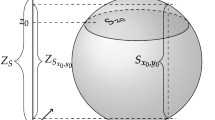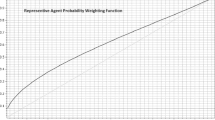Abstract
Empirical evidence from both utility and psychophysical experiments suggests that people respond quite differently—perhaps discontinuously—to stimulus pairs when one consequence or signal is set to `zero.' Such stimuli are called unitary. The author's earlier theories assumed otherwise. In particular, the key property of segregation relating gambles and joint receipts (or presentations) involves unitary stimuli. Also, the representation of unitary stimuli was assumed to be separable (i.e., multiplicative). The theories developed here do not invoke separability. Four general cases based on two distinctions are explored. The first distinction is between commutative joint receipts, which are relevant to utility, and the non-commutative ones, which are relevant to psychophysics. The second distinction concerns how stimuli of the form (x, C; y) and the operation of joint receipt are linked: by segregation, which mixes stimuli and unitary ones, and by distributivity, which does not involve any unitary stimuli. A class of representations more general than rank-dependent utility (RDU) is found in which monotonic functions of increments U(x)-U(y), where U is an order preseving representation of gambles, and joint receipt play a role. This form and its natural generalization to gambles with n > 2 consequences, which is also axiomatized, appear to encompass models of configural weights and decision affect. When joint receipts are not commutative, somewhat similar representations of stimuli arise, and joint receipts are shown to have a conjoint additive representation and in some cases a constant bias independent of signal intensity is predicted.
Similar content being viewed by others
References
Aczél, J. (1966), Lectures on Functional Equations and Their Applications, Academic Press: New York /London.
Aczél, J. and Luce, R.D. (2002), Two functional equations preserving functional forms, Proceedings of the National Academy of Sciences 99, 5212–5216.
Aczél, J., Luce, R.D. and Ng, C.T. (2003), Functional equations arising in a theory of rank dependence and homogeneous joint receipts, Journal of Mathematical Psychology 47, 171–183.
Birnbaum, M.H. (1997). Violations of monotonicity in judgment and decision making, in Marley, A.A.J. (ed.), Choice, Decision, and Measurement: Essays in Honor of R. Duncan Luce. Lawrence Erlbaum Associates: Mahwah, NJ. pp. 73–100.
Birnbaum, M.H., Coffey, G., Mellers, B.A. and Weiss, R. (1992), Utility measurement: Configural-weight theory and the judge's point of view, Journal of Experimental Psychology: Human Perception and Performance 18, 331–346.
Birnbaum, M.H. and Navarrete, J. (1998), Testing descriptive utility theories: Violations of stochastic dominance and cumulative independence, Journal of Risk and Uncertainty 17, 49–78.
Birnbaum, M.H. and Stegner, S.E. (1979), Source credibility in social judgment: Bias, expertise, and the judge's point of view, Journal ofPersonality and Social Psychology 37, 48–74.
Cho, Y.-H., Luce, R.D. and Truong, L. (2002), Duplex decomposition and general segregation of lotteries of a gain and a loss: An empirical evaluation, Organizational Behavior and Human Decision Making 89, 1176–1193.
Ellermeier, W. and Faulhammer, G. (2000), Empirical evaluation of axioms fundamental to Stevens' ratio-scaling approach. I. Loudness production, Perception and Psychophysics 62, 1505–1511.
Falmagne, J.-C. (1976), Random conjoint measurement and loudness summation, Psychological Review 83, 65–79.
Falmagne, J.-C., Iverson, G., and Marcovici, S. (1979), Binaural ‘loudness’ summation: Probabilistic theory and data, Psychological Review 86, 25–43.
Gigerenzer, G. and Strube, G. (1983), Are there limits tobinaural additivity of loudness? Journal ofExperimental Psychology: Human Perception and Performance 9, 126–136.
Hosszú, M. (1953), On the functional equation of distributivity, Acta Math. Acad. Sci Hung 4, 159–167.
Hosszú, M. (1959), A generalization of the functional equation of distributivity, Acta Sci. Math. Szeged 20, 67–80.
Krantz, D.H., Luce, R.D., Suppes, P. and Tversky, A. (1971), Foundations of Measurement, Vol. vnIAcademic Press: San Diego.
Levelt, W.J.M., Riemersma, J.B. and Bunt, A.A. (1972), Binaural additivity of loudness, British Journal of Mathematical and Statistical Psychology 25, 51–68.
Luce, R.D. (2000), Utility ofGains and Losses: Measurement-Theoretical and Experimental Approaches, Lawrence Erlbaum Associates: Mahwah, NJ. Errata: see Luce's web page at http: //www.socsci.uci.edu.
Luce, R.D. (2002), A psychophysical theory of intensity proportions, joint presentations, and matches, Psychological Review 109, 520–532.
Luce, R.D. (2004), Symmetric and asymmetric matching of joint presentations, Psychological Review in press.
Luce, R.D. and Marley, A.A.J. (2000), Elements of chance, Theory and Decision 49, 97–126.
Lundberg, A. (1982), Generalized distributivity for real, continuous functions. I: Structure theorems and surjective solutions, Aequationes Mathematicae 24, 74–96.
Lundberg, A. (1985), Generalized distributivity for real, continuous functions. II: Local solutions in the continuous case, Aequationes Mathematicae 28, 236–251.
Lundberg, A. (2004), Variants of the distributivity equation arising in theories of utility and psychophysics, Aequationes Mathematicae in press.
Lundberg, A. and Ng, C.T. (1975), Uniqueness theorems for the representation ø(f (x)g(y) + h(y)), Aequationes Mathematicae 13, 77–87.
Mellers, B.A. (2000), Choice and the relative pleasure of consequences, Psychological Review 126, 910–924.
Mellers, B.A., Schwartz, A., Ho, K. and Ritov, I. (1997), Decision affect theory: Emotional reactions to the outcomes of risky options, Psychological Science 8, 423–429.
Mellers, B.A., Weiss, R. and Birnbaum, M.H. (1992), Violations of dominance in pricing judgments, Journal ofRisk and Uncertainty 5, 73–90.
Slovic, P., Finucane, M., Peters, E., and MacGregor, D.G. (2002), The affect heuristic. in Gilovich, T. Griffin, D. and Kahneman, D. (eds.), Heuristics and Biases: The Psychology ofIntuitive Judgment Cambridge University Press: New York, pp. 397–420.
Steingrimsson, R. (2002), Contributions to Measuring Three Psychophysical Attributes: Testing Behavioral Axioms for Loudness, Response Time as an Independent Variable, and Attentional Intensity, Psychology Ph.D. Dissertation, University of California, Irvine.
Steingrimsson, R. and Luce, R.D. (2003a), Empirical evaluation of a model of global psychophysical judgments: I. Behavioral properties of summations and productions. Submitted.
Steingrimsson, R. and Luce, R.D. (2003b), Empirical evaluation of a model of global psychophysical judgments: II. Behavioral properties linking summations and productions. Submitted.
Wakker, P. (1991), Additive representations on rank-ordered sets. I. The algebraic approach, Journal ofMathematical Psychology 35, 501–531.
Author information
Authors and Affiliations
Corresponding author
Rights and permissions
About this article
Cite this article
Luce, R.D. INCREASING INCREMENT GENERALIZATIONS OF RANK-DEPENDENT THEORIES. Theory and Decision 55, 87–146 (2003). https://doi.org/10.1023/B:THEO.0000024427.27715.0a
Issue Date:
DOI: https://doi.org/10.1023/B:THEO.0000024427.27715.0a




